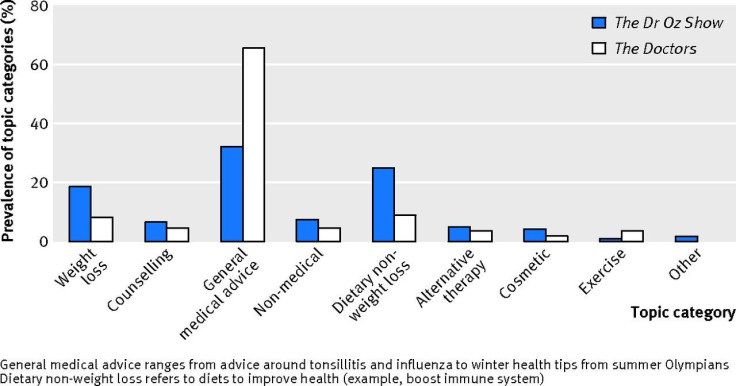The Doctors And Dr. Oz Give Health Advice Based On Evidence Only Half Of The Time

Daytime talk shows aren’t just a sub-prime substitute for actual conversation with your doctor, a new study finds. They could actually be destructive to your health.
In our world of information overload, the health advice that gets relayed via commercialized, ad-infused programming isn’t always reliable. In fact, according to the new study, conducted by researchers at the University of Alberta, as little as half the claims made by on-air personas on The Doctors and Dr. Mehmet Oz, of The Dr. Oz Show, can be supported with scientific evidence.
“People need to be skeptical,” said Dr. Christina Korownyk, lead author and associate professor of family medicine, to Medical Daily. Today’s personal health landscape is fraught with conflicting advice on what to eat, how to exercise, and when to indulge. Without a skeptical eye toward more personalized approaches — rather than generalized ones — people risk paying the price of substandard health. “They need to gather more information before making decisions based on those recommendations,” Korownyk added.
In their study, the researchers gathered data on 40 episodes from The Doctors and The Dr. Oz Show. Experts from various health-focused disciplines analyzed a random collection of 80 pieces of health advice from each show for their scientific accuracy. To qualify as evidence-backed, each piece of advice had to accompany at least one case study, or a better piece of evidence, that corroborated the claim.
In total, 54 percent of the recommendations were verified. For recommendations in The Dr. Oz Show, evidence supported 46 percent of the claims, was absent for 39 percent, and outright contradicted the claims 15 percent of the time. For The Doctors, 63 percent were verified, 24 percent had no evidence, and 14 percent contradicted.

Where the advice tended to slip mostly involved dietary and nutritional claims. One of the hallmarks of Dr. Oz’s program is a revelatory new and hidden ingredient or supplement that can knock out arthritis pain or zap away blemishes. Sometimes the surgeon’s claims have gone too far. In June, the U.S. Senate held a hearing taking Oz to task for his claims that Pure Green Coffee Beans were a “magic weight-loss cure” and “the No. 1 miracle in a bottle.” Chairwoman of the Senate’s Consume Protect Panel Claire McCaskill challenged Oz’s intentions.
“When you call a product a miracle, and it's something you can buy, and it's something that gives people false hope, I just don't understand why you need to go there,” McCaskill told Oz at the time. During his hearing, the doctor repeatedly endorsed the products, despite the absence of total empirical proof.
Some may say the shows aren’t purely for medical advice, or even partially for that purpose. In the fine print of both programs’ websites lurks the familiar warning: This website is for informational and entertainment purposes only and is not a substitute for medical advice, diagnosis or treatment.
If there is any gray area, it is in the balance between what is informational and what is entertainment. Korownyk herself was hesitant to comment on the exact nature of the system that lets 15 percent of health claims slip through the cracks, to the point of contradiction, she conceded that prior discussions with her colleagues concluded the machine of television is “rather complex.” To their mind, it probably has to do with some mix of advertising loyalty and a desire for exposure that lets health claims go unfounded. Personnel from neither The Doctors nor The Dr. Oz Show immediately returned a request for comment.
The best a home-viewer can do is remain skeptical of the information being presented. But as Korownyk points out, even that may be too much effort. With the entire catalog of human knowledge conveniently filed away in web pages, listening to a half hour of health advice, just for the sake of entertainment, may not strike people with the same measure of force or relatability as the daytime soap opera just one channel away. The entire premise of the daytime health talk show may be flawed.
“An interesting question is whether we should expect medical talk shows to provide more than entertainment,” the authors conclude in their report. “Decisions around healthcare issues are often challenging and require much more than non-specific recommendations based on little or no evidence from media health professionals.”
Source: Korownyk C, Kolber M, McCormack J, et al. Televised medical talk shows—what they recommend and the evidence to support their recommendations: a prospective observational study. BMJ. 2014.
Published by Medicaldaily.com



























